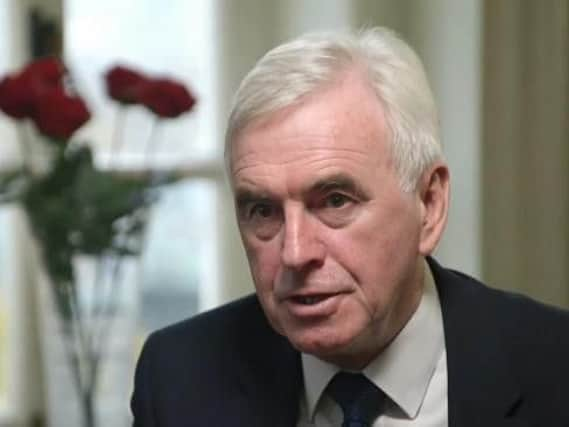Brexit: Labour pushes back against demands for cross-party deal


Mr McDonnell suggested any deal with the Conservatives would have to give MPs a vote on holding a referendum with the option to remain in the EU, as shadow cabinet colleagues said it would be “very difficult” to reach an agreement at all.
Following devastating local election results, the Prime Minister issued a plea to MPs urging them to support cross-party efforts to "break the deadlock" and get a Brexit deal through the Commons.
Advertisement
Hide AdAdvertisement
Hide AdThe Prime Minister said she understood why some of Tory colleagues found the decision to hold talks with Labour "uncomfortable", and admitted it was not what she wanted either.
Mrs May urged Labour leader Jeremy Corbyn to work with her to reach a deal, writing in the Mail on Sunday: "To the leader of the opposition, I say this: let's listen to what the voters said in the elections and put our differences aside for a moment. Let's do a deal."
International Development Secretary Rory Stewart reinforced the Prime Minister’s message, saying the ball was in Mr Corbyn's court.
Speaking to Sky News' Sophy Ridge On Sunday programme, he said: "I think a deal can be done, a lot of this rests on, to be honest, one man: whether Jeremy Corbyn really wants to deliver a Brexit deal.
"But I think if he wants to do it it will be actually surprisingly easy to do because our positions are very, very close."
Mr Stewart added: "Labour and Conservatives at the moment are suffering from this whole Brexit thing - tortuous, sort of endless, Brexit thing and we've got to get beyond it."
But Mr McDonnell played down hopes of a breakthrough, accusing Mrs May of jeopardising cross-party Brexit talks for her own "personal protection".
Following newspaper reports that Theresa May is preparing to give ground this week in the discussions, the Labour frontbencher said the PM had "blown the confidentiality" of the negotiations.
Advertisement
Hide AdAdvertisement
Hide AdHe said his party wanted to get a deal done "as soon as possible" but needed guarantees that an agreement would not be "ripped up" by a future Conservative leader.
And asked on the BBC’s Andrew Marr Show if he trusted Mrs May, Mr McDonnell replied: "No, sorry, not after this weekend when she's blown the confidentiality I had and I actually think she's jeopardised the negotiations for her own personal protection."
Mr McDonnell accused Mrs May of acting in "bad faith" after the Sunday Times reported that the Prime Minister would put forward plans for a comprehensive but temporary customs arrangement with the EU that would last until the next general election.
Mr McDonnell said it "may well" be the case that any deal would have to be voted on in a second referendum, adding: "I think the Conservatives have to recognise that if a deal is going to go through there might be a large number of MPs who will want a public vote."
Earlier, shadow health secretary Jon Ashworth said it was "disappointing" that it appeared Tory ministers and spin doctors had been "briefing about what's happening" in the talks.
And Labour's deputy leader Tom Watson said it would be "very difficult" to agree a deal in the cross-party talks.
"But I don't think we should give false hope on this, it's going to be very difficult to find a negotiated settlement."
Elsewhere, Brexit Party leader Nigel Farage warned Mrs May against agreeing a customs deal with Mr Corbyn, telling the Telegraph: "If the Tories do a deal with Labour on the customs union they will be going into coalition with the Opposition against the people."
Advertisement
Hide AdAdvertisement
Hide AdSir Graham Brady, the chairman of the 1922 committee of Tory backbenchers, told the same paper that staying in a customs union could lead to a "catastrophic split" in the Conservative Party at a time when the opposition is led by "dangerous extremists".
